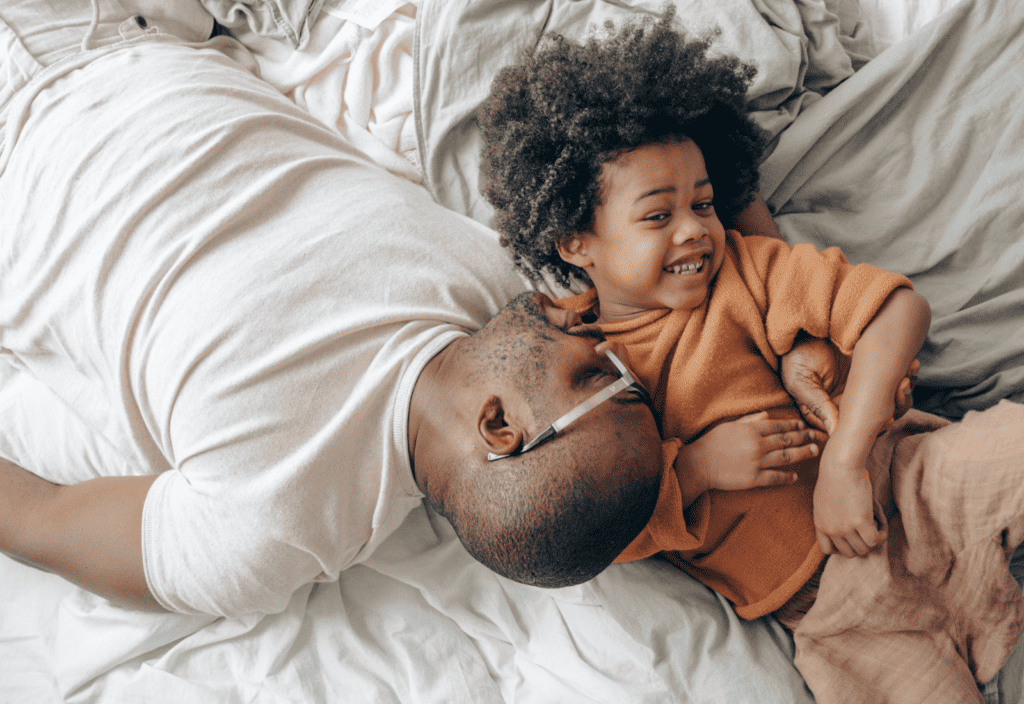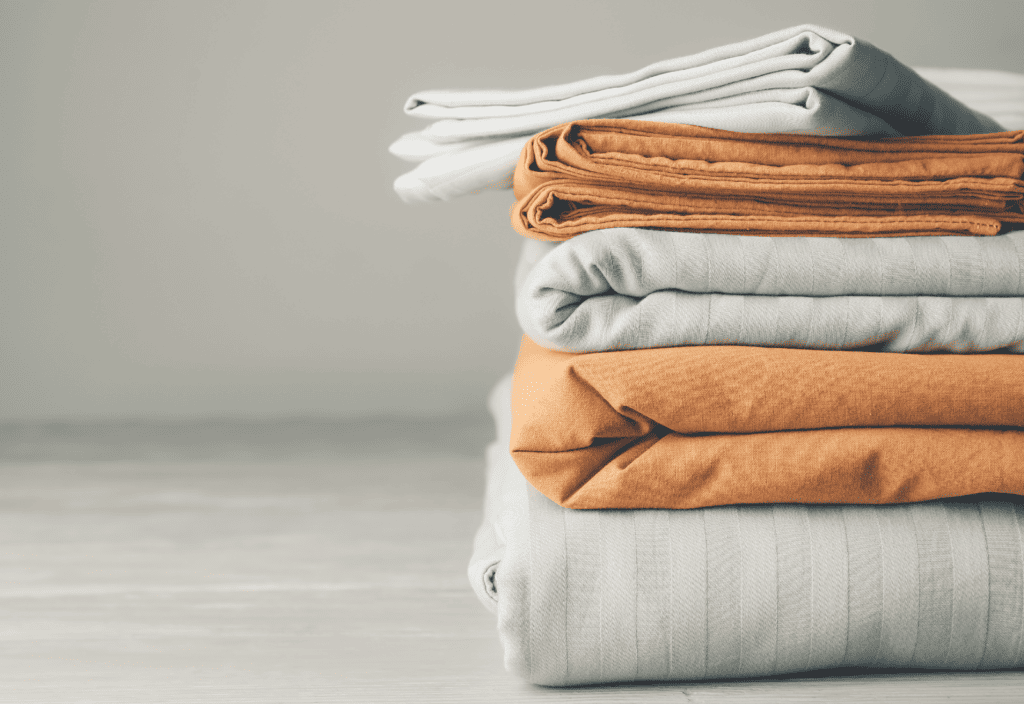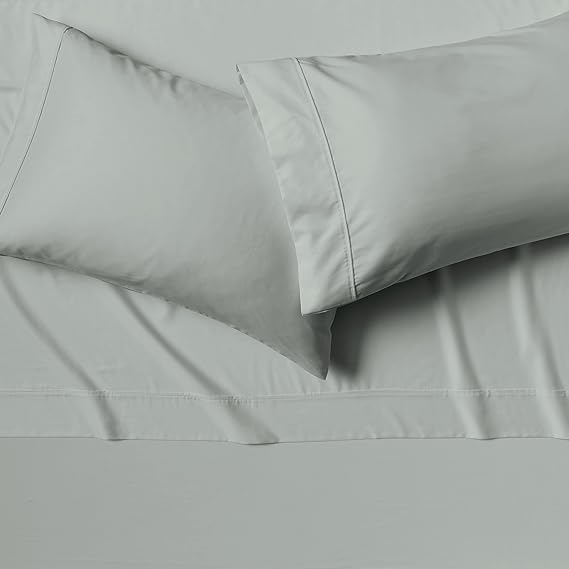We spend more time in our beds than anywhere else, so I am especially thoughtful about the materials I choose for our mattresses, sheets, pillows and the like. Organic cotton and OEKO-TEX sheets are must haves on my list for a healthy sleep space.
Thankfully, they are easier to find and more affordable than ever.

Problems with Traditional Sheets
Cheap sheets are made from polyester. These will sometimes be called microfiber sheets. Polyester is a form of plastic that is derived from petroleum. I don’t know about you, but I prefer not to sleep wrapped in plastic.
100% cotton sheets are a step in the right direction, but even 100% cotton sheets are often dyed with ingredients that aren’t skin-friendly and harm the environment. Fabric dyes can contain heavy metals and other toxins that impact the fabric and the people who work in that industry.
These dyes also pollute ground water, which is a big problem for countries like China who produce a lot of textiles and don’t have strict disposal measures in place. Traditional, low-cost sheets aren’t the best choice for our health or the environment, and thanks to good ole supply and demand, you no longer have to settle for them!
The Difference Between Organic Cotton and OEKO-TEX Sheets
GOTS Certified organic cotton and OEKO-TEX sheets can both be good choices, but they are not the same thing. Let’s take a closer look at the two certifications.
OEKO-TEX Certification
Standard 100 by OEKO-TEX certification can be given to most any fabric as long as it tests free of a long list of toxins that have been deemed particularly harmful to humans.
OEKO-TEX is one of the world’s best-known labels for harmful substance testing in textiles. The label ensures that every component of a piece of clothing is tested for the list of toxins.
Standard 100 actually has four levels depending on what the textile will be used for. If a textile will be next to a baby’s skin it has a lower threshold for toxins than say a rug that will be stepped on in the bathroom.

This post contains affiliate links. At no cost to you, I may earn a small commission on qualifying purchases. Your support means so much to me.
GOTS Certified Organic
Only natural fabrics (e.g. cotton, linen, etc.) can receive a Global Organic Textile Standard (GOTS) certification, but it requires a great deal more than simply using organic cotton.
GOTS is the worldwide leading textile processing standard for organic fibers, including ecological and social criteria. This is an independent certification that is available to the textile industry.
As a focus on sustainability, GOTS evaluates the processing and manufacturing of textiles on the basis of both, environmental and social criteria. This includes assessments on everything from the chemical inputs used to the ethical treatment of workers. A company must meet all criteria to obtain a GOTS certification.
The GOTS standard covers the processing, manufacturing, packaging, labelling, trading and distribution of all textiles made from at least 70% certified organic fibers. There are two GOTS label-grades: “organic” requiring a minimum of 95% organic fibers and “made with organic materials” requiring at least 70% organic fibers.
GOTS certified organic cotton is the gold standard when it comes to fabric.
What About Turkish Cotton?
Turkish grows exclusively in the Aegean Region and have extra-long fibers and requires fewer joins, which results in stronger and smoother cotton threads. The Aegean Region is known for its eco-friendly textiles.
Turkish cotton actually becomes softer after a few washes due to their unique makeup. Turkish cotton products often carry safety certifications like Standard 100 by OEKO-TEX or GOTS organic cotton. If you see that sheets are made with Turkish cotton, this is a good sign.
Best Brands of Organic Cotton and OEKO-TEX Sheets
Under the Canopy
Under the Canopy makes their 300 thread count sheets in Pakistan with long-staple organic cotton. They are also GOTS and OEKO-TEX certified. Their cotton sheets come in various styles like jersey, flannel and sateen and lots of calming colors.
Under the Canopy strives to bring safe and stylish products to everyone not just the wealthy, and I love that. Their sheets even come in a reusable cotton bag in an effort to reduce plastic. They are currently offering 25% off your first order with email sign up.
West Elm/Pottery Barn + PB Kids and Teen
Williams Sonoma owns West Elm and Pottery Barn, so you will often see similar products. As for pricing, I find that Williams Sonoma to be substantially more expensive when it comes to sheets with West Elm being next and Pottery Barn being the most affordable.

There is also Pottery Barn Kids and PB Teen. West Elm and Pottery Barn (all stores) offer 100% cotton OEKO-TEX sheets as well as GOTS cotton sheets and cotton/linen sheets.
I’ve owned several pairs of Pottery Barn (kids and teen) sheets, and they’ve all been extremely high quality and comfy. My kids always outgrew the pattern/bed size well before the sheets could wear out.
Some Pottery Barn sheets are made in Fair-Trade Certified factories, but that claim is not made across the board.
Great Bay Home
Great Bay Home cotton OEKO-TEX sheets are available via Amazon. They have a beautiful selection of flannel Turkish cotton sheets made from 190 GSM 100% Turkish cotton flannel. I do not see a thread count listed.
While I haven’t tried these sheets, the patterns are adorable, and the reviews are excellent.
Budget-Friendly Organic Sheets
Amazon Aware has organic cotton OEKO-TEX sheets for right around $45 at the time of this post, which is a steal. These are a great budget pick IMHO.
They are 300 thread count, and they are made in India. The color options and sizes are limited, but I suspect their selection will increase as this is a fairly new product.
Takeaway
Hopefully, you fell in love with some of these organic cotton or OEKO-TEX sheets! There is nothing quite like the feel of fresh cotton sheets at the end of a long day. Enjoy!
